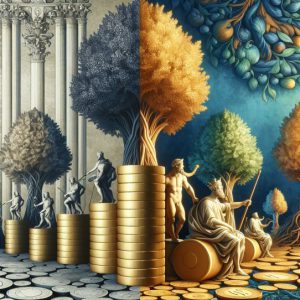
Editor: Vladimir Bajic | Tactical Investor
Fake News Stories: Will the Problem Get Better or Worse?
March 2023
Experts are evenly divided on whether the next decade will witness a decrease in counterfeit and deceptive reports online. Those predicting amelioration rely on technical solutions and societal changes. Conversely, others hold that the negative aspects of human nature are aided more than impeded by technology.
The Oxford Dictionaries recognized “post-truth” as the word of the year in 2016. The selection was due to the impact of the digital era on news and cultural narratives. New information platforms encourage people to find information that aligns with their views, feeding an age-old instinct. A study of over 900 news sources and 376 million Facebook users’ interactions revealed people prefer information that aligns with their perspectives.
Fake News Stories
This preference makes people susceptible to misinformation, including fake news stories. In June 2017, fake news reported that Vitalik Buterin, Ethereum’s founder, had died in a car accident. This caused Ethereum’s market value to plummet by $4 billion.
Tom Rosenstiel’s statement accurately highlights the complexity of addressing the problem of misinformation. Misinformation is not a singular problem that can be easily solved through technical means but rather a multifaceted social issue that requires continuous attention and adaptation.
One of the critical challenges in addressing misinformation is the changing nature of truth. In the past, authoritative sources such as governments, academic institutions, and traditional media outlets often dictated the truth. However, in today’s networked world, truth is increasingly determined by the collective judgments of peers.
This shift has created new challenges for those who seek to report and combat misinformation. Every fact now has a counterpoint, which can be amplified and spread rapidly through online networks. It is essential to have a nuanced understanding of how information spreads in online networks and to adapt strategies to continually address the evolving nature of misinformation.
Moreover, the problem of misinformation cannot be tackled by any one actor alone. It requires collaboration between technology companies, policymakers, journalists, and the public to create effective solutions. Addressing misinformation will require a multifaceted approach combining technical solutions with cultural change and public education.
BBC Experiment
In 2017, BBC Future Now interviewed a panel of 50 experts regarding society’s significant challenges in the 21st century. Most experts identified the breakdown of trusted information sources as the major challenge. Kevin Kelly, the co-founder of Wired magazine, stated that the new shape of truth is the biggest challenge in reporting the news.
A Pew Research Center study conducted after the 2016 US election found that 64% of adults believe fake news stories confuse. Additionally, 23% acknowledged sharing fabricated political stories themselves, sometimes unintentionally.
Future of Misinformation
The question remains: will the issue of fake news stories in the digital age improve or worsen in the coming decade? Pew Research Center and Elon University’s Imagining the Internet Center conducted a large-scale survey of experts, scholars, and practitioners in the summer of 2017 to answer this question. Source
Fake News Stories: The Challenge of Misinformation in Contemporary Times
Misinformation, defined as any information that turns out to be false, has become a major challenge in the 21st century. Fake news stories have been identified as a significant contributor to contentious contemporary events such as elections, referenda, religious persecution, and the global response to the COVID-19 pandemic. Misinformation leads to poor judgements and decision-making and has a lasting influence on people’s reasoning even after it has been corrected, known as the continued influence effect.
Factors Contributing to Misinformed Views and Psychological Barriers to Knowledge Revision
This review discusses the cognitive, social, and affective factors that lead people to form or endorse misinformed views. Psychological barriers to knowledge revision after correcting misinformation are also examined, including theories of continued influence. It is essential to understand individual decision-makers cognitive architecture and social context to comprehend the psychology of misinformation and how it might be countered.
Pre-emptive and Reactive Interventions to Reduce the Effects of Misinformation
The effectiveness of pre-emptive and reactive interventions to reduce the effects of misinformation is discussed. Educational and pre-emptive interventions, refutations, and psychologically informed technological solutions are provided as guidance on countering misinformation.
Implications for Information Consumers and Practitioners
The review concludes with a discussion of the practical implications of misinformation on journalism, public health, policymaking, and education. While technology has contributed to the prevalence of fake news stories, conventional efforts to combat misinformation have also been unsuccessful. Therefore, it is essential to consider the cognitive, social, and affective drivers of attitude formation and truth judgments to counter the spread of misinformation effectively.
Misinformation Throughout History: The Influence of Technology
Misinformation has been present throughout history, and its prevalence cannot be fully grasped without considering contemporary technology. Misinformation helped bring Roman emperors to power, and Nazi propaganda heavily relied on the printed press, radio, and cinema. Today, fake news stories can leverage the digital infrastructure that is unparalleled in its reach. The internet enables senders to tailor persuasive messages to the specific psychological profiles of individual users. Moreover, social media users’ exposure to information that challenges their worldviews can be limited when communication environments, known as echo chambers, foster confirmation of previous beliefs.
Limitations of the Information Deficit Model
Science communication has relied on an information deficit model for decades when responding to misinformation. The model focuses on people’s misunderstanding of, or lack of access to, facts, assuming that a thorough and accessible explanation of facts can overcome the impact of misinformation. However, the information deficit model ignores the cognitive, social, and affective drivers of attitude formation and truth judgments. Thus, to understand the psychology of misinformation, it is essential to consider individual decision-makers cognitive architecture and social context.
Fake News Stories: Practical Implications
The prevalence of fake news stories has practical implications for journalism, education, and policymaking. It is essential to consider the cognitive, social, and affective drivers of attitude formation and truth judgments to counter the spread of misinformation effectively. Pre-emptive and reactive interventions such as educational and pre-emptive interventions, refutations, and psychologically informed technological solutions are necessary to reduce the effects of fake news stories. The continued influence effect also needs to be considered when correcting misinformation, as it has a lasting influence on people’s reasoning even after it has been updated. Source
Other Articles of Interest

Mob Mentality Psychology: Understanding and Profiting

IBM Stock Price Prediction: Time to Buy or Fly?

Examples of Herd Mentality: Lessons for Learning and Earning

When is the Next Stock Market Crash Prediction: Does it Matter?

Inductive vs Deductive Analysis: The Clash of Perspectives

Investor Sentiment Index Data: Your Path to Market Success

Unraveling Market Psychology: Impact on Trading Decisions

Is Value Investing Dead? Shifting Perspectives for Profit

What Will Happen When the Stock Market Crashes: Time to Buy

Dogs of the Dow 2024: Barking or Ready to Bite?

The Trap: Why Is Investing in Single Stocks a Bad Idea?

How Can Stress Kill You? Unraveling the Fatal Impact

Financial Mastery: Time in the Market Trumps Timing

Investment Pyramid: A Paradigm of Value or Risky Hail Mary?

Contrarian Investing: The Art of Defying the Masses


